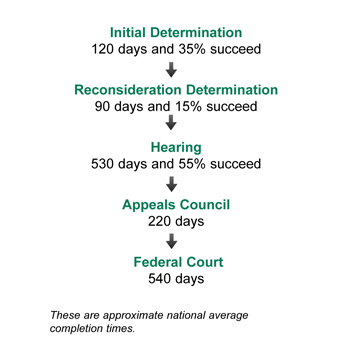When should I apply for benefits?
Should I apply for disability?
If your answers match the ones below, the Social Security Administration (SSA) is likely to award you benefits.
- Are you gainfully employed? No
- Do you have a severe impairment? Yes
- Will your impairment last 12 months or result in death? Yes
- Does your disability meet one of SSA’s listed impairments? If yes, you qualify. If no …
- Are you able to work? No
How long do disability appeals take?

When should I apply for disability benefits?
Unless you have an obvious long-term disability, the best time to apply for Social Security disability benefits is 6-9 months after you stop working.
What does a disability lawyer do?
The big-picture answer is: analyze what needs to be proven to win benefits, figure out how to prove it, and gather the necessary evidence. Some of the specific tasks are:
- Obtain reports from treating doctors that are consistent with Social Security regulations
- Refer claimants to specialists for additional reports that answer questions raised by Social Security regulations
- Obtain a vocational expert’s evaluation of the claimant’s ability to work
- Ask that a prior application for benefits be reopened
- Seek a waiver of a time limit
- Request subpoenas to insure the presence of crucial witnesses or documents
- Advise the claimant on how best to prepare for and testify at the hearing
- Object to improper evidence or procedures at the hearing
- Cross-examine adverse witnesses
- Present a closing statement
- Submit a written summary of the evidence and argument
- If the claimant wins, make sure the SSA correctly calculates benefits
- If the claimant loses, request review of the hearing decision by the Appeals Council
How long will I wait for a disability hearing?
It can take up to two years from request until a hearing is held and a decision issued, but the time varies from state to state.
What are hearings like?
They are private, held in a small conference room, and last an hour or so. You will be asked about your education, training, work experience, symptoms, limitations, and daily activities.
If you have not filed your appeal within 65 days of the date on your denial letter, you have to start over with a new claim. That new claim may result in the loss of back benefits.
What is the biggest mistake made by disability applicants?
Because the majority of appeals are granted at a hearing, failing to appeal a denial to the hearing level is the number one error … and unfortunately very common.
More detailed information on these and other common claimant questions is available in the library below.

